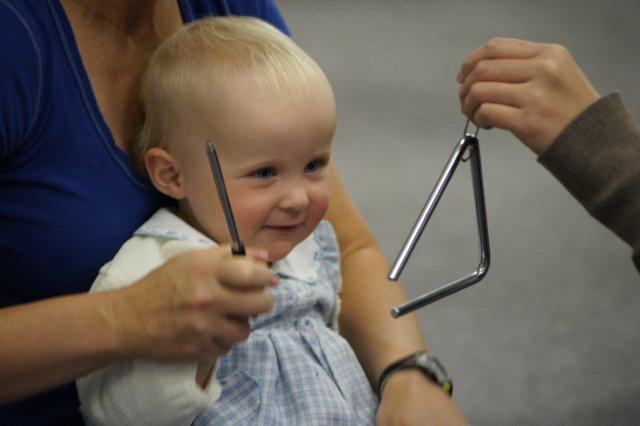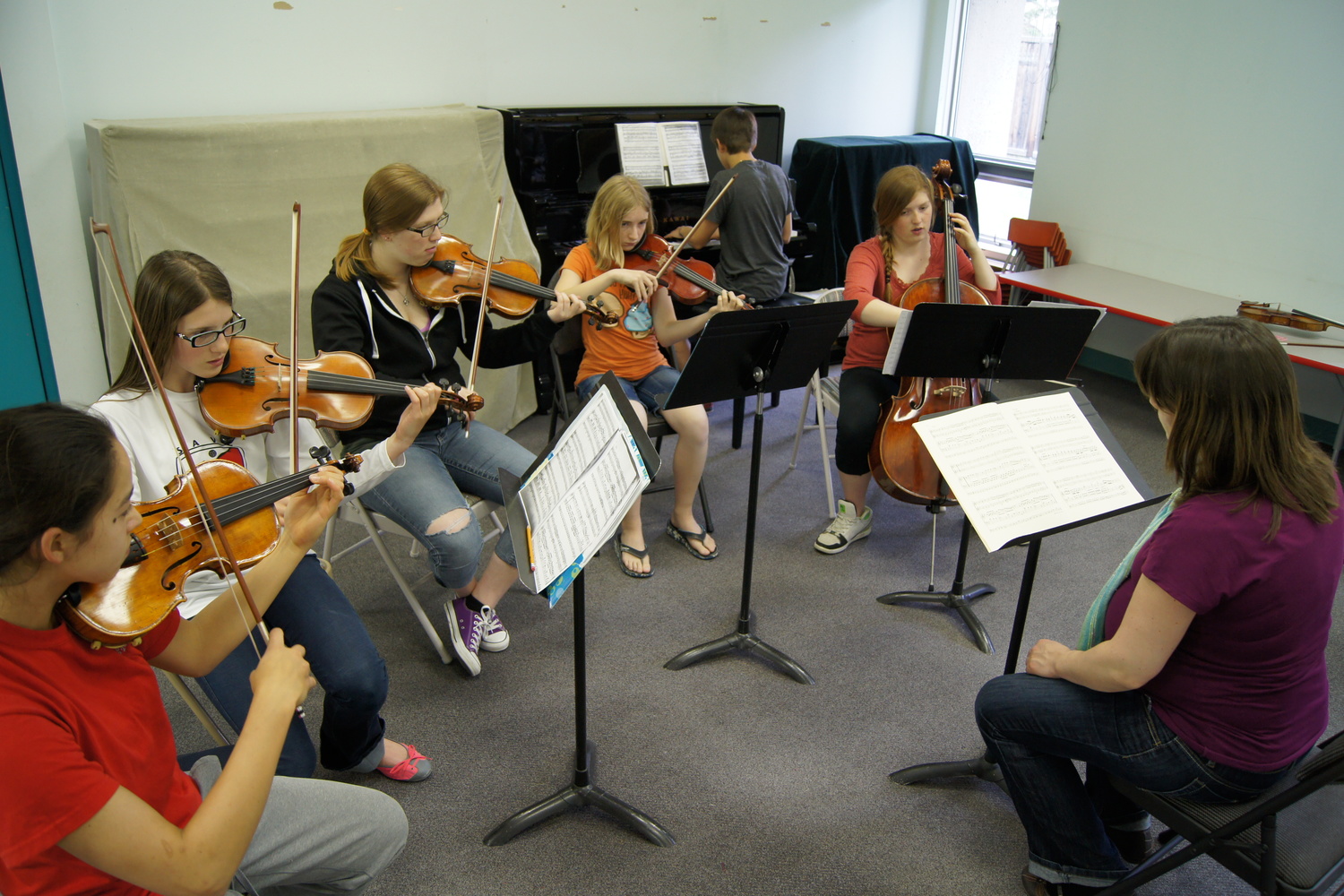FAQ
It is a method of teaching music to children long before they can read. Suzuki method also focuses on character development using music as it’s tool. The child follows the example of the parent in the same way that a child learns to talk.
The student can start as a baby and there is a natural progression to an instrument. The method is based on the way babies learn, not the way babies learn in grade 2 or higher.

Babies can learn music while having fun.
Starting early maximizes the child’s development – not just in musical ability but in brain, social and character development.
Related article: Babies’ Brains Benefit from Music Lessons, Even Before They Can Walk and Talk – ScienceDaily (May 9, 2012)
Parents play an active role in Suzuki education both in the lessons and in home practice. Parents ensure that children have many opportunities for daily listening to tapes or CDs of pieces being studied. While children are learning basic skills of posture, position and rhythm, parents learn to play the first song of the Suzuki repertoire – Twinkle, Twinkle, Little Star with four rhythmic variations – on their child’s instrument. Prior musical experience is not expected of parents. However, learning to play allows parents to serve as role models for children and to gain a better understanding of what children are experiencing. After mastering the Twinkle variations, parents act as observers in the lessons, using lesson activities to guide home practice. Parents are also active in group classes, serving both as assistants to teachers and as supportive audiences for students.
The Suzuki Society starts from the premise that any child can learn to play a musical instrument. Because children show a natural curiosity about music and musical instruments, the appropriate question for parents may not be “Is my child ready?” but “Am I ready?”
If parents can commit to regular attendance at lessons and classes, if they can set aside regular daily listening and practice time, if they enjoy spending time with their children, if they take delight in their children’s smallest accomplishments, if they can deal calmly with the backward steps as well as the steps forward, they are probably ready to consider Talent Education for their children. And if parents are ready, then their children will usually be ready too.
Many people who have seen Talent Education students perform in concert or on television come away with the misconception that training is all by ear because all the children on stage play from memory. While ear training and memorization are key elements of Suzuki training, students are also taught to read music.

Because Talent Education is built on the model of language learning, students learn to play before being introduced to reading music (just as children learn to speak before learning to read words). Many factors are considered before children are taught to read music. These factors include the child’s sense of ease with the instrument, fluency of playing, age and general reading readiness. In preparation for learning sight-reading skills, students work with specially designed pre-reading and theory games in lessons and in group classes. When deemed ready by the teacher, students begin a structured program of sight-reading training that parallels the memorized Suzuki repertoire. Students who have advanced to reading music are given opportunities to perform in chamber music ensembles and orchestras.
Public performances are an important part of Talent Education because they contribute significantly to the development of musicianship and self-esteem. Performances range from informal home concerts for friends and relatives to formal solo recitals and large group concerts. At the Suzuki Society, every child has the opportunity to participate in at least two large group concerts and two solo recitals each school year. In addition, smaller performances may be scheduled in schools and churches to give students a chance to play for their peers, and in hospitals and nursing homes to give students an opportunity to perform a valuable public service in the community. In the 2001-2002 school year, students performed in the Festival of Trees at the Calgary Convention Centre. In January 2003 and June 2012, the Calgary Philharmonic Orchestra invited Suzuki Society students to perform at an education concert and a pre-concert for the Sarah Chang Bruch Violin Concerto performance. In the spring of 2011, our students were invited to perform at the Japan Relief Fundraiser at the Engineered Air Theatre.
The Suzuki Society provides the instructional program envisioned by Dr. Suzuki with both private lessons and group lessons. Regular group lessons are essential to your child’s enjoyment and ultimate success. In group lessons, your child learns by imitating other children and experiences the motivation that comes from an enjoyable, non-competitive playing experience with others. If you are considering other Suzuki programs, make sure that these programs offer weekly group lessons.
Suzuki group performs at We Will Unite Fundraiser for Japanese Tsunami Relief
The Suzuki Society does not provide instruments. There are, however, a number of businesses in Calgary where quality instruments can be rented or purchased. Suzuki Society teachers will provide families with a list upon request.
Strings and flute instruments come in fraction sizes for ease of handling by small children. Families are asked to make an appointment with their Prepratory class teacher prior to purchasing or renting. This is to ensure the child is properly measured and an appopriate size determined.
The Suzuki Talent Education Society has served the Calgary community for over 35 years and is the only non-profit Suzuki school in Calgary. The Society is managed by a volunteer Board of Directors, a number of whom are parents of Society students. The Suzuki Society provides the instructional program envisaged by Dr. Suzuki with both private lessons and regular group lessons. Group lessons are essential to your child’s enjoyment and ultimate success. In group lessons, your child learns by imitating other children and experiences the motivation that comes from an enjoyable, non-competitive playing experience with others. If you are considering other Suzuki programs, make sure that these programs offer group lessons. There is a unique sense of community among parents, students and faculty not only at concerts but also at group lessons, ensemble rehearsals and early childhood class meetings.

